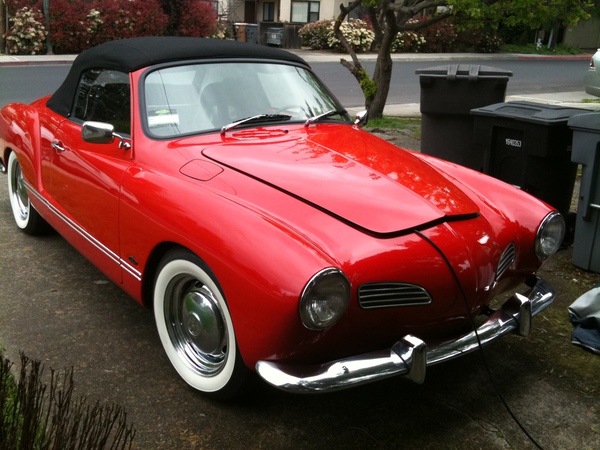 |
| Audi A3 e-tron Sportback plug-in hybrid |
We don’t really think of Volkswagen as producing any kind of electric car, despite having shown a few electric concept cars. However the Volkswagen group includes some other companies like Audi and Porsche, and between the companies they’ve been making some interesting moves towards electrified vehicles. Slowly. However, on the eve of this years Frankfurt International Motor Show, VW’s CEO Prof. Dr. Martin Winterkorn pledged the VW Group would be making big moves into electrified vehicles, and be a global leader by 2018.
That year happens to be when a new round of tightened regulations in the U.S. kick in.
They’re making big sounding noises – they have all the technology in hand – they’ve developed modularized components that act as building blocks – etc ..
Fact is that they’ve been slow coming to the electrified vehicle game. Companies in this group have shown some interesting vehicles, and even have a few on the market or coming to market soon. But where other companies have already been doing electrified vehicles for a couple years, VW is just now beginning to trickle out a vehicle or two.
Like – the Audi A3 Sportback e-tron plug-in hybrid![]() , which has a 0-60 miles/hr time of 7.6 seconds, an astounding 156.81 miles/gallon fuel efficiency, and an electric driving range of about 30 miles.
, which has a 0-60 miles/hr time of 7.6 seconds, an astounding 156.81 miles/gallon fuel efficiency, and an electric driving range of about 30 miles.
 |
| Porsche 918 Spyder plug-in hybrid |
Or what about the Porsche 918 Spyder, a high speed high fuel efficiency supercar for the future![]() that’s a flat out race car with an ingenious plug-in hybrid drive train integrated in ways that work for racing as well as for fuel efficiency and emissions reduction.
that’s a flat out race car with an ingenious plug-in hybrid drive train integrated in ways that work for racing as well as for fuel efficiency and emissions reduction.
 |
| Volkswagen XL1 plug-in hybrid |
And then there’s the Volkswagen XL1 plug-in hybrid concept car![]() that combines extreme aerodynamics, light weight, a hyper-efficient 1-liter engine, to score over 260 miles/gallon fuel efficiency.
that combines extreme aerodynamics, light weight, a hyper-efficient 1-liter engine, to score over 260 miles/gallon fuel efficiency.
But Volkswagen is also part of the consortium of companies that have been slow to develop all electric cars, and have worked with the SAE to ensure the J1772 committee did not ratify CHAdeMO as the standard for DC Fast Charging. That act has delayed the adoption of fast charging, and may have delayed the overall adoption of electric vehicles.
The accusation some make is that the SAE committee was used as leverage to hinder Nissan’s chance of success with the Nissan Leaf by delaying fast charging. That delay was supposed to give time for companies like Volkswagen to get their act together.
Good thing is that Volkswagen is beginning to get there.
 |
| My daily driver – Karmann Ghia conversion |
One still wishes that Volkswagen might bring back the Karmann Ghia as an electric vehicle![]() . Until then …
. Until then …
Volkswagen launches bold offensive for age of electric mobility
Group sets sights on market leadership in electric mobility by 2018
Multi-billion investment in new technologies, 70,000 employees trained
Initially choice of 14 electric and hybrid models by 2014
Winterkorn: “We are starting at exactly the right time”
Wolfsburg/Frankfurt am Main, 09 September 2013 – The Volkswagen Group has set its sights on global market leadership in electric mobility. “We are starting at exactly the right time. We are electrifying all vehicle classes, and therefore have everything we need to make the Volkswagen Group the top automaker in all respects, including electric mobility, by 2018”, Prof. Dr. Martin Winterkorn, CEO of Volkswagen Aktiengesellschaft, said on the eve of the 65th International Motor Show in Frankfurt am Main.
- Highway design could decrease death and injury risk, if “we” chose smarter designs - March 28, 2015
- GM really did trademark “range anxiety”, only later to abandon that mark - March 25, 2015
- US Government releases new regulations on hydraulic fracturing, that some call “toothless” - March 20, 2015
- Tesla Motors magic pill to solve range anxiety doesn’t quite instill range confidence - March 19, 2015
- Update on Galena IL oil train – 21 cars involved, which were the supposedly safer CP1232 design - March 7, 2015
- Another oil bomb train – why are they shipping crude oil by train? – Symptoms of fossil fuel addiction - March 6, 2015
- Chevron relinquishes fracking in Romania, as part of broader pull-out from Eastern European fracking operations - February 22, 2015
- Answer anti- electric car articles with truth and pride – truth outshines all distortions - February 19, 2015
- Apple taking big risk on developing a car? Please, Apple, don’t go there! - February 16, 2015
- Toyota, Nissan, Honda working on Japanese fuel cell infrastructure for Japanese government - February 12, 2015


















Pingback: Post-Dieselgate Volkswagen will focus on electric vehicles – yippee, I hope | The Long Tail Pipe